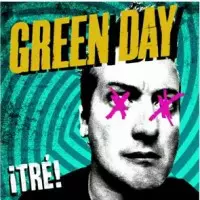Part of what's sustained my enthusiasm for Green Day's music over the years has been my impression of them as outsiders among outsiders. In Cometbus #54, Aaron Cometbus wrote of his friends, "Tré was a weird dude. And kind of dark. Yet he was honest with himself. Whether or not he liked himself, I wasn't sure, but I related to his self-deprecating humor better than, say, Mike's occasional self-righteousness. Billie had neither of these qualities; he appeared to be led along even though he was the one calling most of the shots. It was these subtle dynamics and interactions between them that made them a band." If that description of them is accurate, I would argue the same is true of their fans–for anyone in their 30s or 40s who might associate Green Day with Tilt and Jawbreaker, there's a 10-year-old kid discovering them for the first time by playing Angry Birds or watching The Voice. It's easy to pinpoint how Billie Joe's approach to songwriting has evolved from record to record, but why does it appeal to young kids and teenagers as well as middle-aged adults? My gut says it stems from something he said when accepting a Grammy award a few years ago: rock and roll can be fun and dangerous at the same time.
Whatever the reason for their appeal, the thing that blows my hair back about them the most is how their ambition can give new meaning to an older lyric like "Always move forward / Going straight will get you nowhere" when listening to a new song like "A Little Boy Named Train." Yet, whereas American Idiot and 21st Century Breakdown were written in a studio atmosphere and marketed as grandiose concept albums, these three self-titled ones are a more back-to-basics affair, written in practice spaces and worked out in clubs. That isn't to say either of them don't offer anything new. For one, Jason White is officially credited as a band member and is the guitarist coming through the right speaker, with Billie Joe on the left. For another, I mean, come on, have you heard the guitar tone on "Stay the Night?" Holy fuck.
Musically, ¡Tré! is the subtlest record in the band's oeuvre. The slow, brooding opener, "Brutal Love," brings out horns with scarcely a minute gone by, accompanied by strings shortly after. Lyrically, simple lines like "Bad luck / Bitters and soda / Drop out / Drop-dead hideous / How long is this brutal love?" make it one of the more unsettling and compelling odes to unrequited love I've ever heard. "Missing You" and "8th Avenue Serenade" are more traditional Green Day songs by comparison but have enough melancholy in them that they wouldn't sound out of place on the Replacements' Don't Tell a Soul or All Shook Down. Then there are the bizarrely [read: perfectly] sequenced and mesmerizingly catchy "Drama Queen" and "X-Kid." Blending sexual tension with a good melody is a requirement for most pop songs but I haven't heard them blended as awkwardly as they are in "Drama Queen," and that's a good thing. "X-Kid," written about a friend who committed suicide, just hits every Green Day note and is destined to become a fan favorite.
¡Tré! also marks the first explicit mention of Amanda, an ex-girlfriend of Billie Joe's, and the inspiration for songs as diverse as "Stuart and the Ave." and "Good Riddance (Time of Your Life)," as well as the Whatsername character from American Idiot. Though the song that bears her name is a little on the forgettable side, it does contain a gem of a lyric in "Is this a kind of love only hate would understand?"
The final three songs are redux versions of the three songs the band has written the past decade. "Dirty Rotten Bastards" obviously recalls "Jesus of Suburbia" and "Homecoming" but without the operatic mechanism. Mike's bass playing is given a nice display too, with the last fill maybe being the best one he's ever played. Like "American Idiot" and "Holiday," "99 Revolutions" isn't a profound political statement, but a catchy rock song that will go over well live and put the band on the right side of history, if nothing else. And what "The Forgotten" lacks lyrically, I can appreciate musically. It's a "Hey Jude" rip that goes over about as well as it can.
Whether or not you're a Green Day fan, or if you got off the train some time ago, three albums of genuinely inspired songs make it hard to dispute that they're on top of their game. I can't think of another band that is or was this ambitious twenty years after their first commercial success. If you can sound this good letting the initial experience of playing music with your friends be its own reward, the world is less of a miserable place than it was yesterday. At 40, that's commendable.
